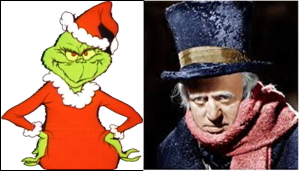By Mike Cronin
Note: This piece was first posted in 2015. I’ve edited it a bit since then.
Like many wars, the so-called War on Christmas is senseless. The flames are being fanned by ogres on both sides.
To hear non-Christians tell it, Christians are trying to impose their religion on everybody else with the greeting “Merry Christmas,” nativity scenes, and the like, or they say that the predominance of Christian trappings are offensive to non-Christians, and that any such displays set on government property constitute an official “establishment of religion,” in violation of the First Amendment. The most vocal anti-Christmas militants are just looking for attention more than resolution. If this argument were settled, they’d be stirring a different pot.
The most strident Christian voices aren’t any better. They’re driven by the same motivation as the anti-Christians. To hear them tell it, they are being persecuted for their beliefs. They argue that the true meaning of Christmas is the celebration of the birth of Jesus, the son of the one true God, who is acknowledged (at least as a prophet if not the messiah) in Judaism and Islam; thus Christmas should be no more offensive to adherents of those faiths than Hanukkah or Eid al-Fitr is to Christians, and that accommodation to atheists, pagans, and other non-believers is not a factor due to their relative scarcity in our society. Extremists argue that Christian decorations on government facilities do not violate the First Amendment because the adornments acknowledge the most prevalent belief system of the people, but do not compel anyone to adopt those beliefs. If they won this battle, they’d be tilting at a different windmill.
Let’s see if we can shed some light into this dark corner.
The term “Christmas” certainly does pertain to the birth of Jesus Christ. But humans have been having winter solstice festivals with lights, gift-giving, gathering to make merry, and breaks from labor since before the current calendar existed and even before Jesus was born. Our ancestors were celebrating the end of the fall harvest and chasing away depression during the darkest time of the year. The Romans called these seasonal celebrations Saturnalia or Natalis Invicti. Norsemen celebrated jól (Yule), a similar pre-Christian winter solstice festival, and origin of the seasonal term “Yuletide.” There are a host of other winter solstice traditions and festivals around the world.
The fact that winter solstice festivals pre-date Christmas as the celebration of the birth of Jesus is not seriously disputed by Christian scholars. Christians that insist that Christmas pertains only to the birth of Christ and, by extension, that the true meaning of Christmas commemorates his teachings, are right about the term “Christmas” at the literal level and wrong about the celebration at the historical level. They are evading the larger fact that there is no hard evidence that Jesus was born on December 25th (or any specific date, for that matter). They are also evading the evidence that the Church has a history of absorbing and re-purposing the festivals of other groups, including solstice celebrations, renaming them, and calling them holy days (i.e. “holidays”).
Yet the mystery of the exact date of Jesus’ birthday predates this phenomenon. The bible does not give a date for Jesus’ birth. According to biblical historian Andrew McGowan, celebrations of Jesus’ birth were not recorded until about 200-300 years after his death. In fact, early Christians avoided attempts to celebrate Jesus’ birth because they associated birth celebrations with paganism. Even today, exact date placement varies among various Christian sects. For example, Eastern Orthodox Christians still celebrate Christmas on or near January 7th. Western Christians refer to this date as the Epiphany and place it on January 6th. There are 12 Days of Christmas between the December 25th and January 6th!
Specifying December 25th as the precise date of Jesus’ birthday was more likely an attempt by the earliest Christians (who were being persecuted) to either rationalize joining in the existing celebrations and/or to use those celebration to provide “cover” for their own. Constantine converting to Christianity in the mid fourth century marks the time when Christianity began to gain supremacy as the religious tradition of the west, and pagan festivals and feasts were subsequently “Christianized” as a matter of policy. In this way, strident Christians are susceptible to the accusation that their religion re-branded solstice festivals as Christmas and bent it to their own ends.
The so-called war on Christmas is being waged in ignorance – from both sides. Anti-Christian scrooges would have us believe Christian greetings, decorations and sentiments are offensive and even illegal. Christian grinches would have us believe Christmas only exists to celebrate Jesus’ birth and teachings, and all other interpretations are wrong, offensive to Christian values, and even heretical. Both are right…to a very shallow point. The power behind each side’s argument is not derived from superficial facts that evade historical context, it is generated by your willingness to listen uncritically and act on their messages. I choose not to do so; I’ll be too busy celebrating the season with friends and family.
Merry Christmas and Happy Holidays!



I love learning about the ‘War on Christmas’. I didn’t know about ‘yuletide’, I’m going to need to learn more about that!
Thanks for this post and Happy Holidays to you too!
LikeLike
Reblogged this on hocuspocus13 and commented:
jinxx🎄xoxo
LikeLike